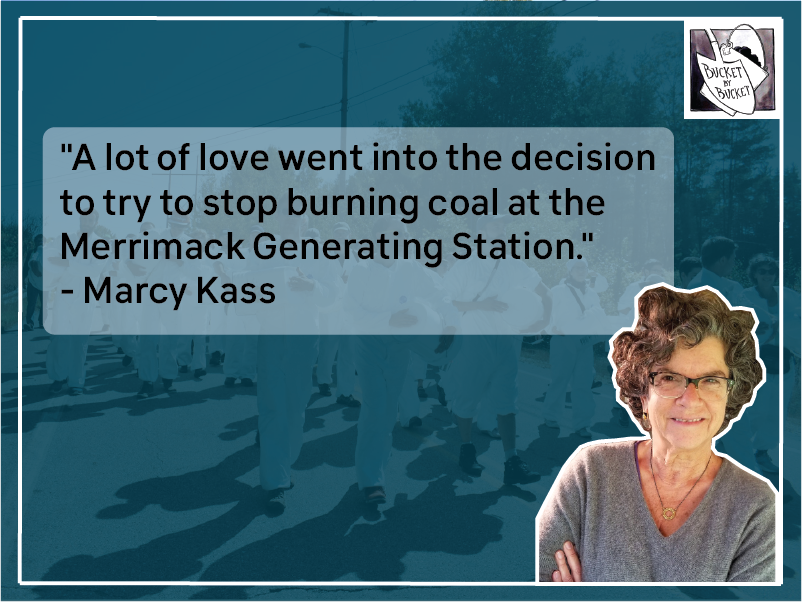Concord, NH - More than 15 months after they were arrested, 19 climate justice activists from the No Coal No Gas campaign were each sentenced to 30 hours of community service after a procedural hearing, which paved the way for automatic appeal to Superior Court and a jury trial. All of the activists were charged with misdemeanor criminal trespass following a September 2019 protest at the Merrimack Generating Station in Bow, New Hampshire; the last coal-fired power plant operating in New England without a shutdown date.
The 19 defendants spoke before Circuit Court Judge Edwin Kelly on January 14th. His written sentencing decision was released on January 26th. In it, Judge Kelly noted that the activists participated in “an organized act of civil disobedience … to demonstrate their opposition to the use of fossil fuel by the owner of the Bow Power Plant. … In the opinion of the Court, the cases before it represent a stark contrast to the recent experience in our nation's capital. The conduct of the defendants was entirely peaceful throughout the event.”
Activists and their legal team declared this a victory - albeit a procedural one - which clears the way for them to proceed to a full trial in which they will ask a jury of their peers to consider that their actions were taken in order to prevent a greater harm and, thus, both necessary and required by conscience.
The decision from Judge Kelly was a sharp rebuke of Concord City Prosecutor Tracy Connolly, who painted the activists as dangerous repeat offenders at their sentencing hearing earlier this month, recommending stiff sentences with minimum $1000 fines and 30 or 60 days of jail time for some of the defendants.
In response to Connolly’s assertion that these activists pose a danger to the public, defense attorney Kira Kelley argued, “Passively accepting climate collapse is dangerous. So is continuing to burn coal. ‘Dangerous’ is anything less than a principled, multi-faceted campaign to combat the fossil fuel industry – including nonviolent civil disobedience when other lawful avenues for change have proven ineffective. This sentence reflects Judge Kelly’s understanding that unlawful behavior does not equate automatically to danger.”
Reflecting on the sentence, defense attorney Logan Perkins said, “We appreciate Judge Kelly’s ability and willingness to recognize the spirit and resolve of our clients and to consider the nature and circumstances of these cases, as well as our clients’ reasons for their actions. We expect those reasons will play a large role in the upcoming jury trial on these matters.”
Nathan Lyczak of Keene, New Hampshire, received the news of his sentence with calm and clarity. "We do not get to choose the moment of our entry into the world, the circumstances that confront us during our lifetime, the choices available, or the consequences that face us for making them – but we can always decide how we will respond to the situation at hand." Lyczak continued, “When confronted by the circumstances of this climate change emergency and the inertia of state and federal government in protecting corporate profitability above public health, our conscience now compels us to respond with non-violent direct action.”
When asked to recount why she felt called to take action at the coal-fired power plant, defendant Marcy Kass of Williston, Vermont, observed, “The social contract between the governors and the governed, which is based on the assumption that our leaders are making the best decisions for our well-being, is broken. We are bound by our love for all of our children to advocate and fight for what’s right when their survival is at stake.”
Merrimack Generating Station continues to operate, propped up annually by tens of millions of dollars of subsidizing “forward capacity payments” that are taken from electrical ratepayers and funneled through ISO-New England, the region’s electricity grid operator. In his written statement to the court, defendant Jeff Gang of Somerville, Massachusetts stated, “Right now, every New Englander’s electric bill supports this power plant — not just by paying for the electricity produced at Merrimack Generating Station, but also sending $188 million in “forward capacity payments” (which amount to subsidies) between 2018 and 2023 to prop up this otherwise uneconomical plant. This number boils my blood at a moment when millions of our neighbors can’t afford rent, when demand at food pantries is higher than ever. If more people knew that their electric bills were subsidizing dirty coal that was deepening the climate crisis, I believe, things would have to change.”
On February 8, 2021, Merrimack Station will bid again to be awarded subsidies to operate into 2025. The No Coal No Gas campaign will continue to organize to stop the climate crisis until the plant is shut down. The 19 activists sentenced this week are moving toward a jury trial in the Merrimack Superior Court in Concord, New Hampshire. Updates on this case and others are posted at NoCoalNoGas.org/news




